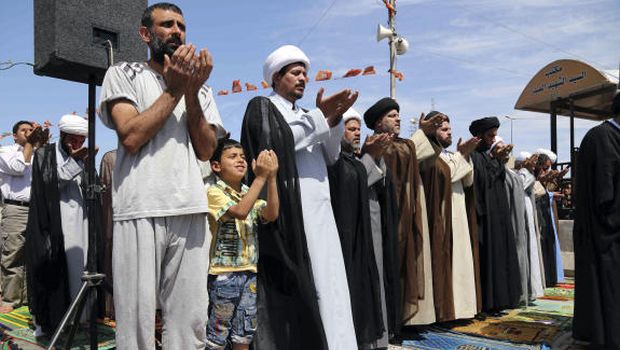
Followers of Shi’ite cleric Moqtada Al-Sadr pray in a street as they attend open-air Friday prayers, in the Shi’ite stronghold of Sadr City, in Baghdad, Iraq, on Friday, April 11, 2014. (AP Photo/Karim Kadim)
Baghdad, Asharq Al-Awsat—The leader of Iraq’s Sadrist movement, Moqtada Al-Sadr, met with Iraq’s most senior Shi’ite cleric, Grand Ayatollah Ali Al-Sistani, in a well-publicized visit on Sunday, despite Sadr’s repeated claims that he has retired from Iraqi politics.
A statement issued by the Sadr bureau said: “Moqtada Al-Sadr visited Grand Ayatollah Ali Al-Sistani at his home in Najaf . . . they discussed the general situation in Iraq and the importance of providing security and services to the Iraqi people.”
The statement added: “Sistani and Sadr condemned sectarianism and terrorism, and stressed the importance of confronting corruption and putting the higher national interest ahead of personal interests, and to preserve national unity.”
The visit took place only two weeks before Iraq’s parliamentary elections, scheduled for April 30, and follows a recent reassertion by Sadr that he intends to remain on the sidelines of Iraqi politics after announcing his withdrawal in February.
During a news conference last week with two MPs who have been excluded from the upcoming elections—Sabah Al-Saadi and Jawad Al-Shahili—Sadr insisted he intended to remain outside the political process and said the current level of Iraqi politics was that of “childish play.”
Meanwhile, the Al-Ahrar bloc, which is affiliated to the Sadr Movement, denied it was in talks with other political parties about forming Iraq’s next government.
The denial followed comments by the leader of the Wataniya bloc, former Prime Minister Iyad Allawi, that it was in talks with Sadr’s followers and members of the Islamic Supreme Council of Iraq (ISCI) on forming a government after the elections at the end of the month.
The Al-Ahrar bloc also said Sadr’s visit to Sistani came at a very important time in the development of Iraq’s political process.
Al-Ahrar MP Hakim Al-Zamili told Asharq Al-Awsat that Sadr and Sistani’s meeting would mobilize support against Iraq’s incumbent prime minister, Nuri Al-Maliki, who is currently seeking a third term in office.
Zamili said: “There are real fears that the peaceful transition of power is today under threat in Iraq by the imposition of the principle of autocracy and the failure to guarantee fairness in the elections . . . Only the [religious] authority can influence people about ending the monopoly of power and authority, which is a very important issue today, where the authority has recognized the grave danger which threatens Iraq.”
In February, Sadr labelled Maliki a “tyrant” and a “dictator,” and called on his followers to take part in this month’s elections, only days after announcing his retirement from politics.
Zamli dismissed Allawi’s comments on coordination between Sadrists, ISCI and the Wataniya bloc as premature, saying: “I think talk about coordination, contacts and meetings between various parties to form the next government is much too early, because we still do not know the nature of the elections and the forces they will produce who could be part of an agreement to form a government.”
He added: “[Our] focus now is on the elections and stressing one important constant which is not allowing anyone to monopolize decision-making in Iraq.”
Another of Sadr’s followers, MP Jawad Al-Shahili, accused Maliki of interfering in the political process to exclude some candidates from the elections in order to “guarantee support and guarantee he wins a third term.”
Shahili has been excluded from the elections by a judicial panel, along with several other candidates who have arrest warrants against them.
Iraq’s parliament has called on the exclusions to be lifted, and for exclusions to be used only against candidates who have been convicted of a crime.
Shahili issued a statement accusing the government of political bias in the exclusion of candidates from the forthcoming elections. He said: “There are more than 22 candidates in the next elections who have not been excluded, despite the fact there are warrants for their arrest according to Article 4 of the anti-terrorism act, because of a deal between Maliki and relevant parties to this issue.”
He added: “Others have been given special dispensation by Maliki, despite being included in the accountability and justice procedures . . . more than 80 people have been excluded from the accountability and justice procedures in addition to 450 candidates who have not been excluded despite having criminal records, following political deals between their blocs and the prime minister.”
Shahili also said that several of the candidates who had been allowed to stand were sitting MPs from Maliki’s State of Law Coalition.
